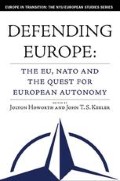Abstract
The terrorist attacks on September 11, 2001 triggered an outpouring of public sympathy and government solidarity toward the United States among its European allies. But the stirrings of a new transatlantic relationship were clear several months earlier, as the rancor that had accompanied the debate over a common European defense policy ebbed away. The Bush administration has taken a more positive approach than its predecessors to the EU’s attempts to develop its own military capacity. And the EU has worked to reassure that ESDP will not undercut NATO.
Access this chapter
Tax calculation will be finalised at checkout
Purchases are for personal use only
Preview
Unable to display preview. Download preview PDF.
Notes
For a European perspective on Turkey and the ESDP, see Gilles Andreani, Christoph Bertram and Charles Grant, “Europe’s Military Revolution” (Centre for European Reform, March 2000).
Congressional Budget Office, “NATO Burdensharing After Enlargement,” August 2001.
Stephan de Spigliere and Dmitri Danilov, From Decoupling to Recoupling: A New Security Relationship between Russia and Western Europe (Paris: WEU Institute for Security Studies, 1998), Chaillot Paper 31.
Klaus Naumann, “Europe’s Military Ambitions,” Centre for European Reform Bulletin (June/July 2000).
Alessandro Politi, Toward a European Intelligence Policy (Paris: WEU Institute for Security Studies, 1998), Chaillot Paper 34.
See Charles Grant, “Intimate Relations: Can Britain Play a Leading Role in European Defense—and Keep Its Special Links with U.S. Intelligence?” Centre for European Reform Bulletin (April 2000).
See Robert Grant, “The RMA—Europe Can Keep in Step,” Occasional Paper 15 (Paris: WEU Institute for Security Studies, June 2000).
See Francois Heisbourg, Centre for European Reform Bulletin (June/July 1999)
and Charles Grant, “European Defense Post-Kosovo,” Centre for European Reform Working Paper, June 1999.
Peter Rodman, “U.S. Leadership and the Reform of Western Security Institutions: NATO Enlargement and ESDP,” speech given at a German Foreign Policy Association conference, December 11, 2000.
Editor information
Editors and Affiliations
Copyright information
© 2003 Jolyon Howorth and John T.S. Keeler
About this chapter
Cite this chapter
Schake, K. (2003). The United States, ESDP and Constructive Duplication. In: Howorth, J., Keeler, J.T.S. (eds) Defending Europe. Europe in Transition: The NYU European Studies Series. Palgrave Macmillan, New York. https://doi.org/10.1057/9781403981363_6
Download citation
DOI: https://doi.org/10.1057/9781403981363_6
Publisher Name: Palgrave Macmillan, New York
Print ISBN: 978-1-4039-6690-2
Online ISBN: 978-1-4039-8136-3
eBook Packages: Palgrave Political & Intern. Studies CollectionPolitical Science and International Studies (R0)

